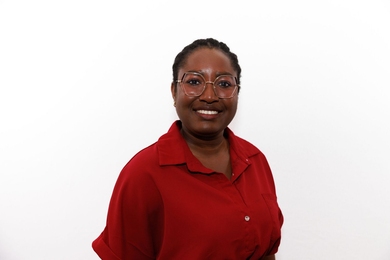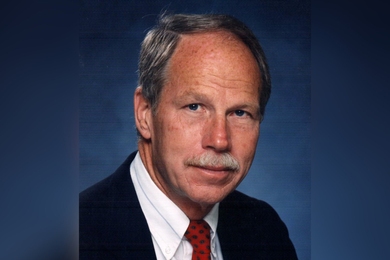Associate Dean Milena M. Levak, director of the International Students Office, will retire on December 17. She has been at MIT since 1986.
Dean Levak, who plans to complete a book based on research she did in Brazil before she embarked on her present career, may also write about her experiences as an advisor. She believes her background in psychology and anthropology served her well during her tenure at MIT.
"Milena is both gentle and sophisticated," said Dean of Students and Undergraduate Education Rosalind H. Williams. "She is immensely knowledgeable about the thicket of rules and regulations applying to international students, but always puts the individual first. She has helped countless students in all sorts of sticky, troublesome situations. She really is a jewel."
"I'm going to miss the interaction with the students very much," said Dean Levak, who held a similar position at Rensselaer Polytechnic Institute from 1984-86 and was an international student advisor at Miami University in Ohio from 1981-84.
The feeling is mutual.
Janet A. Oloo, co-president of the International Students Association, has learned to appreciate Dean Levak's patience, tact and sensitivity. She remembers their first encounter, a welcoming address for freshmen in 1997. "She came across as a humble, respectful and approachable person," said Ms. Oloo, a junior from Kenya.
"She always has time to listen to us, whether it is something to do with visa issues and other problems internationals face," said Ms. Oloo, who is majoring in aeronautics and astronautics. "One does not need to make an appointment; she can be seen in a walk-in basis! That is very convenient for a lot of internationals.
"When interacting with her I have never felt any gap or distance. I talk to her as freely as I talk to my other colleagues and sometimes I have to remind myself of who she is. She is an advisor, a lawyer, a mentor and more importantly a friend. We will surely miss her dearly."
Sanith Wijesinghe, vice president of the Graduate Student Council, came to MIT in 1995 as a junior exchange student from Sri Lanka.
"I owe her a great deal for helping me out with all the paper work and for taking the time to listen to and provide advice on the issues I had to face both before and after arriving here," said Mr. Wijesinghe, who is working toward a doctorate in aeronautics and astronautics.
"I can still remember the orientation session she held for new international students. It was the first time I found someone reaching out and inquiring about the well being of students here. This kind of support is so important especially when you first arrive, and it made all the difference for me," he said.
There have been a number of changes in the international student body since Dean Levak arrived at MIT. The total has increased to 2,300 from 1,800 in 1986. Whereas the major influx once came from mainland China, students from Eastern Europe have come here in increasing numbers since the fall of Communism, many of them from the former Soviet Union.
"The Chinese students believed the institution should take care of them and help them with housing, immigration, and any other issue they encountered because that is the role academic institutions play in China," she said.
"The Russians, on the other hand, have learned to distrust bureaucracy and are probably troubled by the nature of our office. We do deal with visas and other bureaucratic issues; we also care about students and provide help through services and programs," said Dean Levak.
"My impression is that if I ask more than three questions, they start getting suspicious. So I've stopped asking questions. They tell me as much as they feel comfortable with. I let them know I'm here to help them and I'm very happy when they ask for help. It means I've earned their trust."
Dean Levak holds an MA in student personnel and counseling from Miami University, and a doctorate in social and political sciences from the University of Florence in her native Italy. She speaks English and Italian and understands French, Portuguese and Spanish, but has always insisted that students communicate with her in English. "It's the language they need to use in this country and at MIT," she said. "But I make an exception when they are very upset."
A version of this article appeared in MIT Tech Talk on November 17, 1999.





